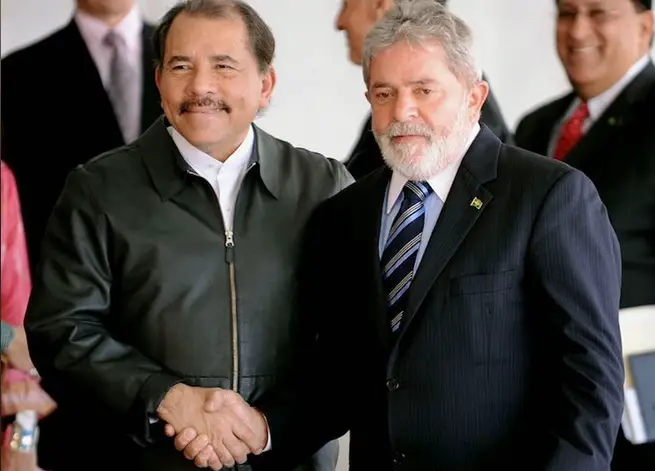21 de junio 2023

Children of Exile: The Births “Sowing Hope” in the Camp of Nicaraguan Farmers

PUBLICIDAD 1M
PUBLICIDAD 4D
PUBLICIDAD 5D
The Brazilian government submitted an alternative text that seeks to tone down the declaration and subdue criticism of the repression in Nicaragua.

Former allies, presidents Daniel Ortega (Nicaragua) and Luis Inacio Lula da Silva (Brazil).| Photo: Archive
Just days before the 53rd General Assembly of the Organization of American States (OAS), during which it is planned to approve a declaration critical of the situation in Nicaragua, the government of Brazil's Luiz Inácio Lula da Silva submitted an alternative text that seeks to tone down the denunciation of repression and violations of human rights and property rights by the Daniel Ortega and Rosario Murillo regime.
A report in the Argentine media outlet Infobae indicates that five country delegations had drafted a proposal for a declaration with the hope of reaching consensus so that the foreign ministers can approve it next week. However, this week the government of Brazil submitted an alternative text which "lowers the tone, removes some criticisms of the dictatorship of Daniel Ortega and adds conditionalities to some of the serious events occurring in the country", according to Infobae.
One of the most important changes proposed by Lula's government is in the penultimate paragraph, where instead of asking the OAS to request the "return" of democracy to Nicaragua, it proposes to request "the strengthening" of the country's democracy.
The report also reveals that in the section that analyzes what is happening in Nicaragua, the originally proposed text expresses "deep alarm" at the reports of the Inter-American Commission on Human Rights (IACHR) on the escalation of repression in Nicaragua. But Brazil asks to replace this with an expression of "concern".
The Brazilian government also asks to remove the lines that mention "the confiscation of property and assets and the denial of pensions for those persons deprived of their nationality by the government" and to add the word "alleged" to the mention of violations of Social Security and property rights carried out by the Nicaraguan dictatorship.
"The Lula government requests removal of the sentence that says that the 'worsening conditions have caused hundreds of thousands of Nicaraguans to leave the country since 2018' and remove the lines in which the countries talk about their concern for Nicaragua's refusal to commit to international human rights mechanisms," reads the article.
Brazil's alternative proposal also seeks to relativize various events that have occurred in Nicaragua. For example, warns Infobae, "in a paragraph that asked Ortega 'to annul the norms that have allowed' the government to arbitrarily deprive Nicaraguan citizens of their nationality, it changes the wording to 'may have allowed.'" Another example reported by Infobae: "Where it said that Ortega's actions 'restrict' public liberties, it proposes to say 'may restrict.'"
The original text also called for "ceasing" all violent actions against individuals, as well as "reestablishing" civil and political rights and "stopping" intimidation and harassment of journalists and religious communities. Brazil proposes "to change those words and seeks to ask Ortega to 'stop' actions 'that could be considered a violation of human rights'. But it does not recognize them as such," says the publication.
In addition to the conditional language, "Brazil's proposal changes in certain verbs to avoid recognizing human rights violations. In these cases, the alternative wording to the proposed request for Nicaragua to 'cease' repression, is to ask the government to 'abstain' from repression, ignoring that these events have already taken place," the article says.
The Brazilian government's argument for softening the declaration on Nicaragua is that "if changes are really wanted" it is necessary to "lower the tone of confrontation and allow building bridges of dialogue".
As such, one of the modifications proposed by Brazil is to substitute the wording in a paragraph that speaks of the OAS General Assembly as being "concerned about Nicaragua's disregard for and refusal to commit itself to international human rights mechanisms", with wording that states that the organization is "willing to engage constructively with Nicaragua with a view to its compliance with its international human rights obligations".
Brazil is a member of the OAS Working Group on Nicaragua, which on June 7 presented a synthesis of its work carried out since 2018. On that occasion, while Chile and Canada presented their criticisms of the Ortega dictatorship, Brazil chose to remain silent, even though Brazil had been critical of the Ortega dictatorship up until Lula assumed power.
Nicaragua's former ambassador to the OAS, Arturo McFields, said that Brazil's proposal is "regrettable", "shameful" and constitutes "a mockery" of the thousands of Nicaraguans who have been victims of the Ortega-Murillo regime in the last five years.
"The most serious thing is where [the Brazilian government] says that in Nicaragua there are no problems with democracy but that democracy must be strengthened," warned McFields. It has been demonstrated that "in Nicaragua there is no democracy, there is a dictatorship that confiscates, exiles and imprisons," he added.
The former ambassador also regretted that the Brazilian delegation to the OAS "is talking about how [in Nicaragua] there are supposed confiscations" and is also "asking that the term dictatorship be eliminated". This is "extremely serious" because "President Lula is lying and telling another story that never existed in Nicaragua", he said.
This article was originally published in Spanish in Confidencial and translated by our staff.
PUBLICIDAD 3M
Confidencial es un diario digital nicaragüense, de formato multimedia, fundado por Carlos F. Chamorro en junio de 1996. Inició como un semanario impreso y hoy es un medio de referencia regional con información, análisis, entrevistas, perfiles, reportajes e investigaciones sobre Nicaragua, informando desde el exilio por la persecución política de la dictadura de Daniel Ortega y Rosario Murillo.
PUBLICIDAD 3D